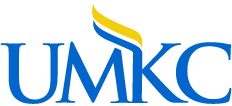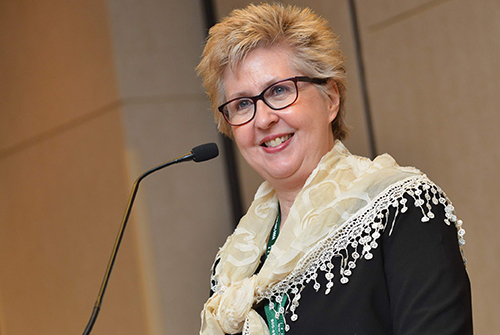With Dr. Marsha Pyle, encounters often start and end with expressions of gratitude — for opportunities and the resulting accomplishments, and for professional relationships and personal friendships.
And so it is with her nearly 12-year tenure as dean of the UMKC School of Dentistry, which came to a close Sept. 1. When she arrived in 2009, Pyle said, the school had a well-earned reputation for strong clinical training, “and I am incredibly grateful for the opportunity I had to keep that tradition going and build on it at UMKC.”
Pyle said a year ago that she would be stepping down this fall as dean. That announcement came shortly after a signature achievement for the school, the opening of its state-of-the-art Pre-clinic Lab.
“Our facility (the lab) was 50 years old and really needed updating,” Pyle said. “Now, it’s spectacular, providing an ergonomically correct, realistic simulation for students before they move on to treating patients. It has the technologically advanced equipment they’re going to see in their practices.”
Rather than coast to retirement, however, Pyle faced another huge challenge in March when the pandemic forced the closure of almost all school facilities. She and her faculty and staff worked tirelessly to quickly shift classes online, and to shut down the school’s dental clinics, revamp them with new safety equipment and procedures, and then reopen them slowly and carefully over the summer.
At the same time, Pyle and her team made sure that the Dental and Dental Hygiene Classes of 2020 could graduate on time, despite not being able to screen patients in anticipation of impending dental licensure board exams. Dylan Weber, a member of the DDS Class of 2020, led the school’s chapter of the American Student Dental Association and knew first-hand how Pyle supported students. So he was only briefly surprised when she called him out of the blue to keep him updated on how the school and the association were working on the changes in licensing and testing.
“That call was one of many instances showing her dedication to the success of her students,” Weber said.
Now, as the school and clinics reopen, Pyle said, “I feel really good about how we’ve handled this and our preparations for the fall. It has been incredibly hard, incredibly time consuming and stressful. Since March, so many faculty members have worked countless hours to make our fall semester as safe as we possibly can while retaining instructional quality and educational purpose.”
Making the Pre-clinic Lab a reality, navigating the pandemic and graduating the Classes of 2020 were quite a trifecta to cap a career. They also built on other hallmarks of Pyle’s years as dean.
Digital technology and dentistry. From an early push into digital X-rays to the latest uses of 3-D printers to make crowns, dentures and other devices, the school has kept up with — or ahead of — dental practice technology. The school’s digital equipment lineup also has oral scanners, state-of-the-art treatment planning software and cone beam tomography. For several years, the school also has been giving students experience in creating and using digital impressions, in the Pre-clinic Lab and in patient care.
Pyle also oversaw the opening of the school’s Innovation Clinic in 2012. A partnership with dental equipment manufacturers, the facility allows students to see and work with the latest equipment.
“If you aren’t changing and innovating, you’re really moving backwards,” Pyle said. “And you have to integrate curriculum and technology, so that students know the science behind the latest devices. We always want students to graduate ready for the practice of the future, and to be able to evaluate expensive technology when they have their own practice.”
Practice management, lifelong learning and research. Because so much is involved in running a modern practice, from human resource issues to expensive equipment purchases, Pyle revamped the school’s practice management curriculum. Instead of taking a course or two, UMKC students now learn business lessons throughout their four years at the school.
“That also reinforces the philosophy of life-long learning,” she said. “You have to be able to see ahead and be ready for change. It’s important for us to instill that kind of mentality and concepts for our students to carry with them throughout their careers.”
Research goes hand-in-hand with that philosophy, Pyle said.
“You can’t have a strong clinical program like ours without science,” she said. “If you’re not creating science, if you’re not discovering, if you’re not supporting scholarship and inquiry and creative thinking, then you’re missing the point on the clinical piece. Such knowledge is vital to good practice and to advancing the profession.”
Fiscal accountability and alumni support. “As state finances have tightened, it has been really important to make sure we were good stewards of our resources and emphasized accountability to the greater university. So we’ve updated a lot of policies and procedures that help us operate a bit more effectively.”
Being clear about its mission and financial needs also has helped the school communicate with alumni and other donors, who are an ever-more-important resource. The credibility that comes with accountability was crucial, for example, to assemble the final funding needed for the Pre-clinical Lab from alumni and the university, which dedicated $2 million from an outside foundation grant to the project.
“It isn’t easy to ask people to do more with less, and to juggle our obligations to our students and our patients to provide high-quality education and dental care,” Pyle said. “One of the biggest things that I’m grateful for is that there is such robust and dedicated support for the school through the Rinehart Foundation, the Dental Alumni Association and the Dental Hygiene Alumni Association. We’ve been able to complete projects like the pre-clinic that wouldn’t have been possible otherwise.”
In turn, alumni appreciate Pyle’s efforts and attention. “From the very beginning of her tenure as dean, Dr. Pyle espoused the importance of strong and vibrant dental school alumni organizations that lend support to the school and university through involvement and philanthropy,” said Charles Squire, who has been deeply involved with the Alumni Association since earning his DDS from the school in 1968. “She willingly and cheerfully gave of her time to meet with alumni and friends, not only in Kansas City but throughout the United States.”
Another key to the school’s success during Pyle’s tenure may be her ability to focus on the task at hand, and to always take her work, but not herself, seriously. That meant Pyle stuck to business almost all the time, but at student and staff holiday functions often was first in line to play an ice-breaker game.
Tamra Hoffman, RDH, clinical instructor and past president of the Dental Hygiene Alumni Association, said: “Dean Pyle is always in business mode, but she also often asks about my daughters and shows much appreciation when I have brought them to community service events. She also has always shown respect toward my ideas and quickly acted on one that allowed our Radiology Department to work more efficiently while allowing our students a better simulation lab for learning.”
When Pyle announced her retirement, her plans included returning as faculty emerita. That changed when an offer came her way to become the senior scholar in residence for the American Dental Education Association, which will require a move to Washington, D.C.
“I’ve always tried to do the right thing in my career, to use my creativity to lead the school and all of our graduates into a positive future. It’s really an amazing place,” Pyle said. “I’ve also done what I could to contribute to the dental professions, and I’ll be able to do that in my new job.”
And after 11 years of creating friendships and relationships, Pyle said, “I’ll be taking a lot of memories with me. The friendships I’ve made will be everlasting.”


